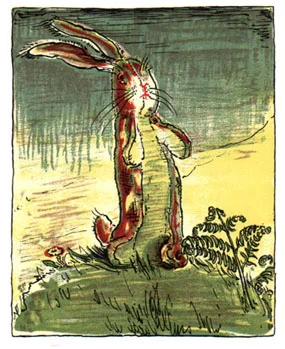The following appeared as commentary in the January 23rd entry of Consuming Fire, the daily devotional version of George MacDonald's Unspoken Sermons.
“Real isn’t how you are made,” said the Skin Horse. “It’s a thing that happens to you. When a child loves you for a long, long time, not just to play with, but REALLY loves you, then you become Real.”
“Does it hurt?” asked the Rabbit.
“Sometimes,” said the Skin Horse, for he was always truthful. “When you are Real you don’t mind being hurt.”
-- from The Velveteen Rabbit by Margery Williams
Have you ever felt that God is dangerous to know? At a certain point in my life, when my husband lost his job and things went steadily from bad to worse, I really felt that way. Whenever I asked God for anything, it was like a backfire-spell that would ensure the opposite took place. I had then a fear of God, not in the way they say you should--a sort of holy, reverent fear--but something bordering on terror of an otherworldly entity who does what he wants, despite my tears and pleas. This was not how I thought it would be. I stopped asking him for things.
For several years, I didn’t pray for anything for myself, except to not lose my faith, my knowledge of him. No more pleas for rent money, car repairs, or health. No petitions for bad things not to happen, not even a weather request. God was fire and pain--the unpredictable, implacable manager of a seemingly unending program of affliction. He had once been my friend.
During this time, I read a lot of George MacDonald, because he never glossed this over. He recognized the crucible of doubt both as a danger and as a chance to become real, Velveteen Rabbit style. The fire is a time of doubt. But a time of doubt can be the best healer of all, once we open ourselves to its work. Let go of control. Learn contentment. Practice being, simply being, without any expectations, in the actual unfolding moment instead of the past or future.
These things don’t come easily, are not there for the picking from a ripened tree. Afflictions, uncertainties, and fears about God are actually his fertilizer, agents to help us become. In this place one can no longer live by his own or others’ ideas of who God is. Not even from a book. Now we learn face-to-face, from experience. When we are finished wrestling against the Consuming Fire, there is a discovery at its center. God is not an enemy bent on hurting us, but a friend who desires our healing. Burned clean, we learn to trust him not for what he will do in this world, but for what he is making us into for the next.
I am no longer afraid to pray, afraid of what God might do if I ask for the wrong thing. I even pray for the weather, just for fun. I trust him more now. But prayer is a little bit dangerous. When we ask to know him, he will show us who he is. He will strip our eyes to see truly, without the veil of control or the comfort of a bombproof belief system. To know God through doubt is to know him at the central core of one’s being. It is painful, and it is transforming.
Through the fire we are forced to release fear, guilt, anger and self-condemnation, or else die from them. To realize that suffering can have a purpose greater than the gifts of this world is to relate in fullness to the “suffering servant,” the One who saves the soul through loss. Relationship is love, and love casts out fear. Through experience we learn trust.
Once burned by Love’s flames, the soul is turned from this earth to the one about to be. It is forced away from the material towards the spiritual. Fear, worry, and doubt go up like smoke from the burning and we are made a new creature indeed. We are born again. We become real.
Like MacDonald, William Blake grasped the depth of spiritual truth to be gained through doubt and confusion. He also understood the terrible cost that must be paid if we would know truth in the innermost being. Blake wrote:
What is the price of Experience? Do men buy it for a song,
Or Wisdom for a dance in the street? No! It is bought with the price
Of all a man hath--his house, his wife, his children.
Wisdom is sold in the desolate market where none can come to buy,
And in the wither’d field where the farmer ploughs for bread in vain.

